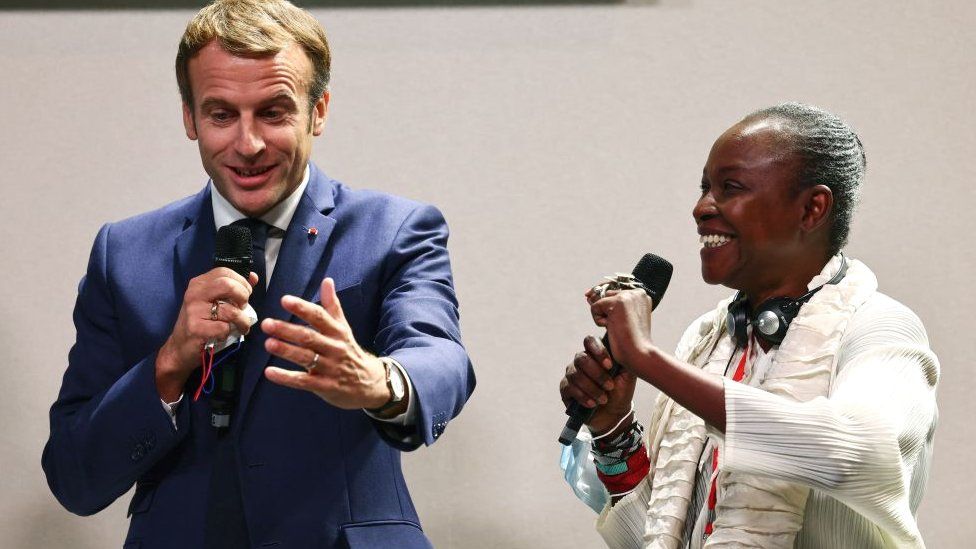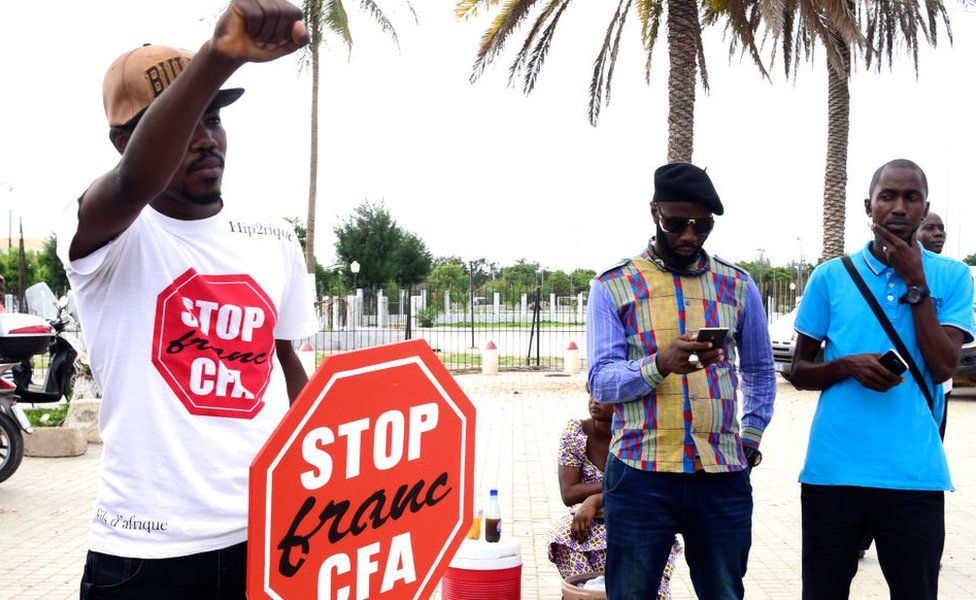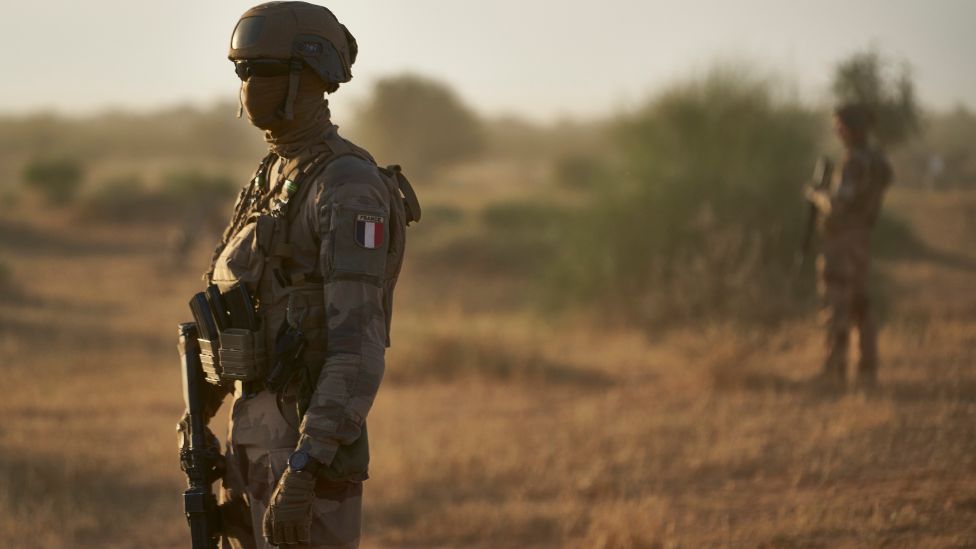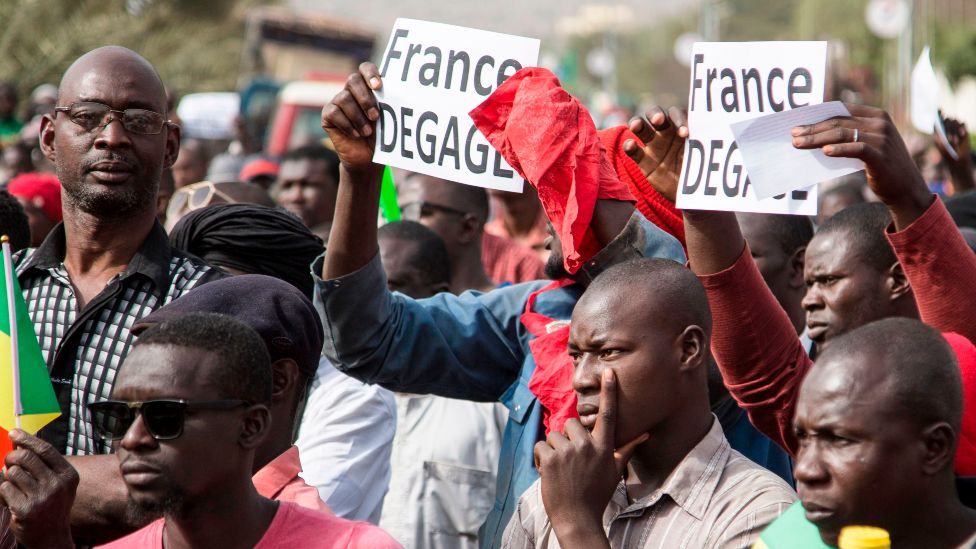为什么法国在西非面临如此多的愤怒
https://www.bbc.com/news/world-africa-59517501
作者:Paul Melly 非洲分析师 2021 年 12 月 5 日
马里发生多起针对法国的抗议活动
一切都是如此积极地开始。 哪里出了问题? 为什么法国现在在非洲显得如此不受欢迎?
法国总统马克龙增加了对非洲大陆的援助,开始归还殖民战争期间被盗的文物,并超越通常的政府间关系,吸引年轻一代和民间社会参与。
他让法国军队留在萨赫勒地区,与圣战武装分子作战,这些武装分子杀害了许多当地平民、警察和士兵,并支持西非经共体地区集团,因为该组织试图捍卫选举政治,反对军事接管。
今年,他飞往卢旺达,公开承认法国在 1994 年种族灭绝期间的失败。
然而,他的国家现在成为非洲怨恨和批评的目标,其规模可能是前所未有的。
上个月,一支法国军队车队向北前往支持打击伊斯兰武装分子,在穿越布基纳法索和尼日尔时多次遭到抗议者封锁。
9月,马克龙开始缩减在马里的驻军规模后,马里总理乔格尔·马伊加在联合国发表讲话,指责法国“中途抛弃了自己的国家”,引起了一阵同情的评论。 国家。
在进步的西非评论员和城市青年中,现在经常听到废除非洲金融共同体法郎的呼声。非洲法郎是许多法语国家使用的区域货币,在法国政府的担保下与欧元挂钩。 批评者称,这使法国能够控制使用该系统的国家的经济,而法国则表示,这保证了经济稳定。
新殖民主义的傲慢
如何解释这个悖论? 一位比最近几位前任更关心非洲、也更了解非洲大陆正在发生变化的总统,为何会遇到几十年来从未有过的法国不受欢迎的情况?
当然,马克龙先生自信(批评者会说傲慢)的个人风格是一个因素。
喀麦隆出生的策展人 Koyo Kouoh(右)和法国总统埃马纽埃尔·马克龙于 2021 年 10 月 8 日在法国蒙彼利埃举行的非法峰会上关于归还非洲遗产的会议上发表讲话
尽管向非洲伸出援手,马克龙总统仍面临强烈反对,他也犯过一些外交错误。
2019 年 11 月,13 名法国士兵在马里的一次直升机失事中丧生后,他要求西非领导人飞往法国参加紧急峰会,这种爆发被视为新殖民主义的傲慢,特别是考虑到马里和尼日尔最近遭受了更严重的军事损失。
马克龙总统被迫迅速调整路线,飞往尼日尔首都尼亚美,悼念尼日尔阵亡军人,并将峰会推迟到 2020 年 1 月。
但法国目前不安的原因也可以追溯到马克龙 2017 年当选之前的几十年。
科特迪瓦政治分析家西尔万·恩格桑(Sylvain Nguessan)解释说:“你可以引用与殖民统治有关的历史争议。我们中的许多人都是了解殖民时期及其耻辱的父母的孩子。”
在独立后的早期几十年里,法国与非洲领导人和精英保持着紧密的个人联系网络(被称为“法国非洲”),这种网络常常陷入既得利益的相互保护,而很少考虑人权或透明度。
在外部势力中,巴黎并不是唯一一个与独裁盟友勾结的国家,但其关系尤其密切且不容置疑。
魅力与变革
最致命的失败发生在 1994 年的卢旺达,当时法国没有采取行动,而其盟友、时任总统朱韦纳尔·哈比亚利马纳 (Juvenal Habyarimana) 的政权已开始准备种族灭绝。
2017 年 9 月 16 日,塞内加尔达喀尔,一名男子在反对非洲金融共同体法郎的反殖民示威中举起拳头。CFA 是一种殖民时代的货币,至今仍在非洲的几个前法国殖民地使用
从 20 世纪 90 年代中期开始,多国政府致力于改革法国与非洲的接触,并更加重视发展和民主治理。
但后来势头减弱。
尼古拉·萨科齐 (Nicolas Sarkozy) 2007 年就任总统时,极其缺乏机智地表示“非洲人还没有充分进入历史”。 他偏爱老盟友,例如自 1967 年以来一直统治加蓬的邦戈家族。
2012 年弗朗索瓦·奥朗德就任总统时,他别无选择,只能关注萨赫勒地区(撒哈拉沙漠以南的一大片土地)的安全问题。 他从来没有真正拥有恢复改革努力的政治力量。
但随着马克龙先生就职,法国有了一位充分意识到变革必要性的总统,并且拥有完成这项任务的政治影响力和个人热情。
2017年,他告诉布基纳法索首都瓦加杜古的学生,如果非洲各国政府愿意,法国将支持非洲金融共同体法郎的改革。 他还邀请民间社会、青年和文化人士参加今年在蒙彼利埃举行的法国-非洲峰会,而不是像往常一样邀请总统。
萨赫勒——溃烂的伤口
然而,他愿意直言不讳、挑战旧结构和质疑舒适假设的意愿并不总是奏效,即使是在那些呼吁变革的人中也是如此。
法国士兵在布基纳法索北部与马里和尼日尔边境的一次行动中监视乡村地区 - 2019 年 11 月 10 日, 尽管法国采取了反恐行动,武装分子仍然是西非广大萨赫勒地区的一个主要问题。此外,萨赫勒局势已恶化为溃烂的伤口。
法国的军事存在加剧了整个西非日益普遍的不满情绪。
尽管法国进行了大规模和持续的军事努力,部署了 5000 多名士兵,并造成 50 多人死亡,但仍无法决定性地克服圣战分子的威胁,圣战分子对当地社区和安全部队的袭击仍在继续。
原因很复杂,既有军事的,也有社会的,也有环境的和经济的。
然而,相当一部分当地舆论认为,法国作为西方高科技军事强国,本来应该能够“解决”这个问题,如果不能这样做,现在就应该让路。
这些情绪似乎激发了封锁法国军队车队的抗议者。
正如恩格桑先生指出的那样,这是在早些时候引起不满的原因之后发生的:“萨科齐在达喀尔的演讲、马克龙在瓦加杜古的演讲、科特迪瓦的战争、反恐行动令人沮丧的结果。
“问题涉及货币、债务、对当地独裁者的支持以及措辞不当。”
2020 年 1 月 10 日,在巴马科举行的针对法国和驻马里联合国部队的抗议活动中,人们举着法文标语:“法国滚出去”。
法国仍然被视为保守派建制派的支柱——即使支持民主机构,但潜在的社会和公共因素也会影响一些人的态度。
萨赫勒地区的一名高级军官表示,他认为法国人是马里北部图阿雷格人前分离主义叛乱分子的盟友——这一指控在巴黎遭到了强烈而可信的否认。
法国对西非区域机构西非经共体的支持也存在类似的复杂性,该机构目前正试图向马里和几内亚的政变领导人施压,要求其迅速恢复文官宪政。
越来越多的年轻人将这一地区集团视为现任总统的俱乐部,批评操纵民主规则的文官统治者的速度太慢,也不愿承认民众对承诺改革的军事领导人的支持力度。
因此,在支持西非经共体作为合法的非洲危机管理机构的过程中,法国最终被视为守旧派的支持者。
保罗·梅利是伦敦智库查塔姆研究所非洲项目的顾问研究员。
Why France faces so much anger in West Africa
https://www.bbc.com/news/world-africa-59517501
By Paul Melly Africa analyst
Mali has witnessed several protests against France
French President Emmanuel Macron has increased aid to the continent, begun the return of cultural artefacts stolen during the colonial wars and reached out beyond the usual inter-government ties to engage younger generations and civil society.
He has kept French troops in the Sahel to fight the jihadist militants that kill so many local civilians, police and soldiers and supported the regional bloc Ecowas as it tries to defend electoral politics against military takeovers.
This year he flew to Rwanda to publicly acknowledge French failures during the 1994 genocide.
Yet his country is now the target of embittered African complaints and criticism on a scale that is probably unprecedented.
Last month, a convoy of French troops heading north to support the fight against Islamist militants was repeatedly blockaded by protesters as it crossed Burkina Faso and Niger.
In September Mali's Prime Minister Choguel Maïga was met with a wave of sympathetic comment when he used a speech at the UN to accuse France of "abandoning his country in mid-flight", after Mr Macron began to scale back the deployment of troops in the country.
Among progressive West African commentators and urban youth, it is now commonplace to hear calls for the abolition of the CFA franc - the regional currency used by many francophone countries and which is pegged to the euro under a French government guarantee. Its critics say this enables France to control the economies of those countries which use it, while France says it guarantees economic stability.
Neo-colonial arrogance
What explains this paradox? How is it that a president more concerned for Africa than most recent predecessors, and more aware too of how the continent is changing, encounters a level of French unpopularity not felt for decades?
Certainly, Mr Macron's self-confident - critics would say arrogant - personal style is a factor.

He has made his share of diplomatic blunders.
After 13 French troops died in a helicopter crash in Mali in November 2019 he demanded that West African leaders fly to France for an emergency summit, an outburst perceived as neo-colonial arrogance, particularly as Mali and Niger had suffered far heavier recent military losses.
President Macron was forced into a rapid course-correction, flying to Niamey, Niger's capital, to pay his respects to the Nigérien military dead and postponing the summit until January 2020.
But the causes of France's current discomfort also extend back to decades before Mr Macron's election in 2017.
"You can cite historical controversies linked to colonisation. Many of us are the children of parents who knew the colonial period and its humiliations," explains Ivorian political analyst Sylvain Nguessan.
During the early post-independence decades, France maintained a dense web of personal connections with African leaders and elites - dubbed "françafrique" - which too often slid into a mutual protection of vested interests, with little regard for human rights or transparency.
Among outside powers, Paris was far from alone in colluding with dictatorial allies, but its relationships were particularly close and unquestioning.
Charisma and change
The most damning failure came in Rwanda in 1994, when France failed to act even as its ally, the regime of then-President Juvenal Habyarimana, began to prepare genocide.

From the mid-1990s onwards several governments worked to reform France's engagement with Africa and give more priority to development and democratic governance.
But momentum later faltered.
Nicolas Sarkozy began his tenure as president in 2007 by remarking, with a spectacular lack of tact, that "the African man has not sufficiently entered into history". He favoured old allies such as the Bongo family, who have governed Gabon since 1967.
When François Hollande became president in 2012 he had no choice but to focus on security issues in the Sahel - a swathe of land south of the Sahara desert. He never really had the political strength to revive reform efforts.
But with Mr Macron's accession to office, France had a president fully aware of the need for change - and with the political clout and personal enthusiasm to attack the task.
In 2017 he told students in the Burkinabe capital, Ouagadougou, that France would back a reform of the CFA franc if African governments wanted this. He also invited civil society, youth and cultural figures to this year's France-Africa summit in Montpellier, rather than the usual flock of presidents.
Sahel - a festering wound
Yet his readiness to speak plainly, challenge old structures and question comfortable assumptions has not always played well, even among those who are clamouring for change.
 IMAGE SOURCE,AFP Image caption,
IMAGE SOURCE,AFP Image caption,
Moreover, the situation in the Sahel has deteriorated into a festering wound.
The French military presence fuels an increasingly widespread sense of grievance across West Africa.
Despite a massive and sustained military effort - with more than 5,000 troops deployed and more than 50 killed - France has not been able to decisively overcome the threat from jihadists, whose attacks on local communities and security forces continue.
The reasons are complex, both military and social, environmental and economic.
Yet a significant proportion of local public opinion feels that France, as a high-tech Western military power, should have been able to "sort" the problem and should now get out of the way if it cannot do so.
Those feelings seem to have motivated the protesters who blockaded the French army convoy.
And this comes after earlier causes of resentments, as Mr Nguessan points out: "The speeches of Sarkozy in Dakar, Macron in Ouagadougou; the war in Ivory Coast; the discouraging results of the campaign against terrorism.
"Questions related to the currency, debt, support for local dictators and ill-chosen words."
 IMAGE SOURCE,AFP Image caption,
IMAGE SOURCE,AFP Image caption,
But underlying social and communal factors also shape the attitudes of some.
One senior Sahel military officer says he sees the French as allies of Tuareg former separatist rebels in northern Mali - an allegation fiercely and credibly denied in Paris.
Similar complexities surround France's support for West Africa regional body Ecowas - which is currently trying to pressure coup leaders in Mali and Guinea to rapidly return their countries to civilian constitutional rule.
A growing number of young people regard the regional bloc as an incumbent presidents' club, too slow to criticise civilian rulers who manipulate democratic rules and unwilling to acknowledge the strength of popular support for military leaders promising reform.
So in backing Ecowas as the legitimate African crisis management institution, France ends up being perceived as a prop for the old guard establishment.
Paul Melly is a consulting fellow with the Africa Programme at the think-tank Chatham House in London.